Changle Qu
MatchTIR: Fine-Grained Supervision for Tool-Integrated Reasoning via Bipartite Matching
Jan 15, 2026Abstract:Tool-Integrated Reasoning (TIR) empowers large language models (LLMs) to tackle complex tasks by interleaving reasoning steps with external tool interactions. However, existing reinforcement learning methods typically rely on outcome- or trajectory-level rewards, assigning uniform advantages to all steps within a trajectory. This coarse-grained credit assignment fails to distinguish effective tool calls from redundant or erroneous ones, particularly in long-horizon multi-turn scenarios. To address this, we propose MatchTIR, a framework that introduces fine-grained supervision via bipartite matching-based turn-level reward assignment and dual-level advantage estimation. Specifically, we formulate credit assignment as a bipartite matching problem between predicted and ground-truth traces, utilizing two assignment strategies to derive dense turn-level rewards. Furthermore, to balance local step precision with global task success, we introduce a dual-level advantage estimation scheme that integrates turn-level and trajectory-level signals, assigning distinct advantage values to individual interaction turns. Extensive experiments on three benchmarks demonstrate the superiority of MatchTIR. Notably, our 4B model surpasses the majority of 8B competitors, particularly in long-horizon and multi-turn tasks. Our codes are available at https://github.com/quchangle1/MatchTIR.
KuaiLive: A Real-time Interactive Dataset for Live Streaming Recommendation
Aug 07, 2025
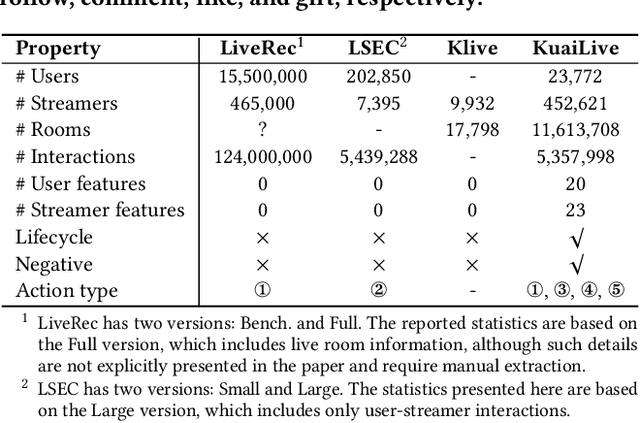


Abstract:Live streaming platforms have become a dominant form of online content consumption, offering dynamically evolving content, real-time interactions, and highly engaging user experiences. These unique characteristics introduce new challenges that differentiate live streaming recommendation from traditional recommendation settings and have garnered increasing attention from industry in recent years. However, research progress in academia has been hindered by the lack of publicly available datasets that accurately reflect the dynamic nature of live streaming environments. To address this gap, we introduce KuaiLive, the first real-time, interactive dataset collected from Kuaishou, a leading live streaming platform in China with over 400 million daily active users. The dataset records the interaction logs of 23,772 users and 452,621 streamers over a 21-day period. Compared to existing datasets, KuaiLive offers several advantages: it includes precise live room start and end timestamps, multiple types of real-time user interactions (click, comment, like, gift), and rich side information features for both users and streamers. These features enable more realistic simulation of dynamic candidate items and better modeling of user and streamer behaviors. We conduct a thorough analysis of KuaiLive from multiple perspectives and evaluate several representative recommendation methods on it, establishing a strong benchmark for future research. KuaiLive can support a wide range of tasks in the live streaming domain, such as top-K recommendation, click-through rate prediction, watch time prediction, and gift price prediction. Moreover, its fine-grained behavioral data also enables research on multi-behavior modeling, multi-task learning, and fairness-aware recommendation. The dataset and related resources are publicly available at https://imgkkk574.github.io/KuaiLive.
From Exploration to Mastery: Enabling LLMs to Master Tools via Self-Driven Interactions
Oct 10, 2024



Abstract:Tool learning enables Large Language Models (LLMs) to interact with external environments by invoking tools, serving as an effective strategy to mitigate the limitations inherent in their pre-training data. In this process, tool documentation plays a crucial role by providing usage instructions for LLMs, thereby facilitating effective tool utilization. This paper concentrates on the critical challenge of bridging the comprehension gap between LLMs and external tools due to the inadequacies and inaccuracies inherent in existing human-centric tool documentation. We propose a novel framework, DRAFT, aimed at Dynamically Refining tool documentation through the Analysis of Feedback and Trails emanating from LLMs' interactions with external tools. This methodology pivots on an innovative trial-and-error approach, consisting of three distinct learning phases: experience gathering, learning from experience, and documentation rewriting, to iteratively enhance the tool documentation. This process is further optimized by implementing a diversity-promoting exploration strategy to ensure explorative diversity and a tool-adaptive termination mechanism to prevent overfitting while enhancing efficiency. Extensive experiments on multiple datasets demonstrate that DRAFT's iterative, feedback-based refinement significantly ameliorates documentation quality, fostering a deeper comprehension and more effective utilization of tools by LLMs. Notably, our analysis reveals that the tool documentation refined via our approach demonstrates robust cross-model generalization capabilities.
Tool Learning with Large Language Models: A Survey
May 28, 2024Abstract:Recently, tool learning with large language models (LLMs) has emerged as a promising paradigm for augmenting the capabilities of LLMs to tackle highly complex problems. Despite growing attention and rapid advancements in this field, the existing literature remains fragmented and lacks systematic organization, posing barriers to entry for newcomers. This gap motivates us to conduct a comprehensive survey of existing works on tool learning with LLMs. In this survey, we focus on reviewing existing literature from the two primary aspects (1) why tool learning is beneficial and (2) how tool learning is implemented, enabling a comprehensive understanding of tool learning with LLMs. We first explore the "why" by reviewing both the benefits of tool integration and the inherent benefits of the tool learning paradigm from six specific aspects. In terms of "how", we systematically review the literature according to a taxonomy of four key stages in the tool learning workflow: task planning, tool selection, tool calling, and response generation. Additionally, we provide a detailed summary of existing benchmarks and evaluation methods, categorizing them according to their relevance to different stages. Finally, we discuss current challenges and outline potential future directions, aiming to inspire both researchers and industrial developers to further explore this emerging and promising area.
ReCODE: Modeling Repeat Consumption with Neural ODE
May 26, 2024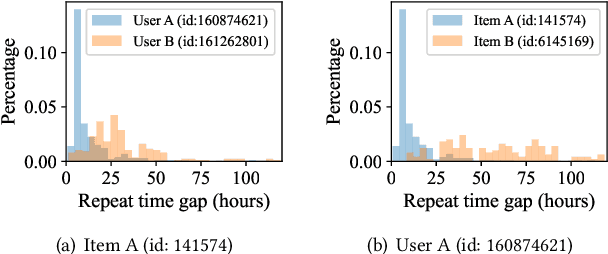

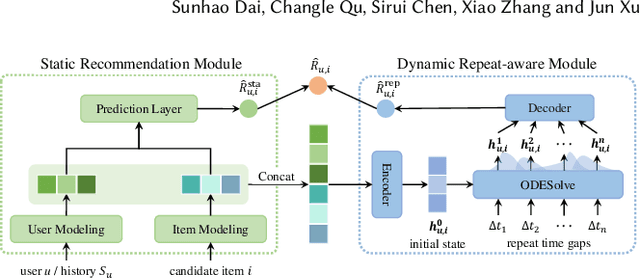

Abstract:In real-world recommender systems, such as in the music domain, repeat consumption is a common phenomenon where users frequently listen to a small set of preferred songs or artists repeatedly. The key point of modeling repeat consumption is capturing the temporal patterns between a user's repeated consumption of the items. Existing studies often rely on heuristic assumptions, such as assuming an exponential distribution for the temporal gaps. However, due to the high complexity of real-world recommender systems, these pre-defined distributions may fail to capture the intricate dynamic user consumption patterns, leading to sub-optimal performance. Drawing inspiration from the flexibility of neural ordinary differential equations (ODE) in capturing the dynamics of complex systems, we propose ReCODE, a novel model-agnostic framework that utilizes neural ODE to model repeat consumption. ReCODE comprises two essential components: a user's static preference prediction module and the modeling of user dynamic repeat intention. By considering both immediate choices and historical consumption patterns, ReCODE offers comprehensive modeling of user preferences in the target context. Moreover, ReCODE seamlessly integrates with various existing recommendation models, including collaborative-based and sequential-based models, making it easily applicable in different scenarios. Experimental results on two real-world datasets consistently demonstrate that ReCODE significantly improves the performance of base models and outperforms other baseline methods.
COLT: Towards Completeness-Oriented Tool Retrieval for Large Language Models
May 25, 2024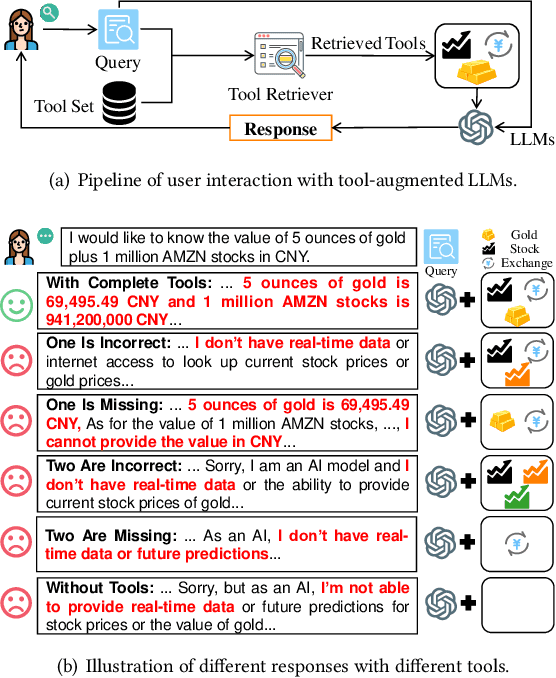


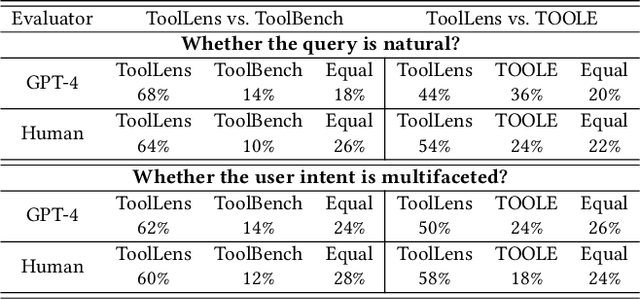
Abstract:Recently, the integration of external tools with Large Language Models (LLMs) has emerged as a promising approach to overcome the inherent constraints of their pre-training data. However, realworld applications often involve a diverse range of tools, making it infeasible to incorporate all tools directly into LLMs due to constraints on input length and response time. Therefore, to fully exploit the potential of tool-augmented LLMs, it is crucial to develop an effective tool retrieval system. Existing tool retrieval methods techniques mainly rely on semantic matching between user queries and tool descriptions, which often results in the selection of redundant tools. As a result, these methods fail to provide a complete set of diverse tools necessary for addressing the multifaceted problems encountered by LLMs. In this paper, we propose a novel modelagnostic COllaborative Learning-based Tool Retrieval approach, COLT, which captures not only the semantic similarities between user queries and tool descriptions but also takes into account the collaborative information of tools. Specifically, we first fine-tune the PLM-based retrieval models to capture the semantic relationships between queries and tools in the semantic learning stage. Subsequently, we construct three bipartite graphs among queries, scenes, and tools and introduce a dual-view graph collaborative learning framework to capture the intricate collaborative relationships among tools during the collaborative learning stage. Extensive experiments on both the open benchmark and the newly introduced ToolLens dataset show that COLT achieves superior performance. Notably, the performance of BERT-mini (11M) with our proposed model framework outperforms BERT-large (340M), which has 30 times more parameters. Additionally, we plan to publicly release the ToolLens dataset to support further research in tool retrieval.
 Add to Chrome
Add to Chrome Add to Firefox
Add to Firefox Add to Edge
Add to Edge